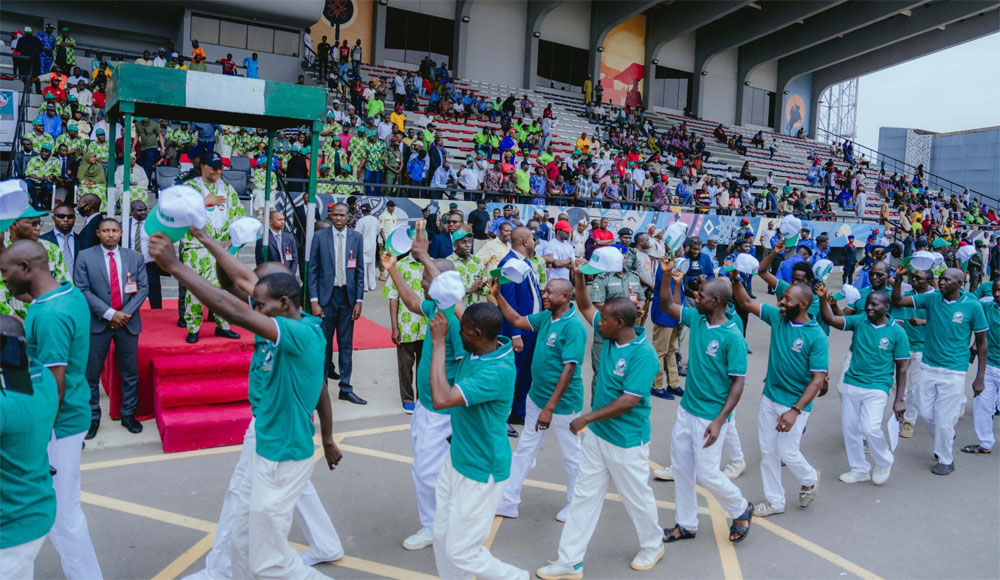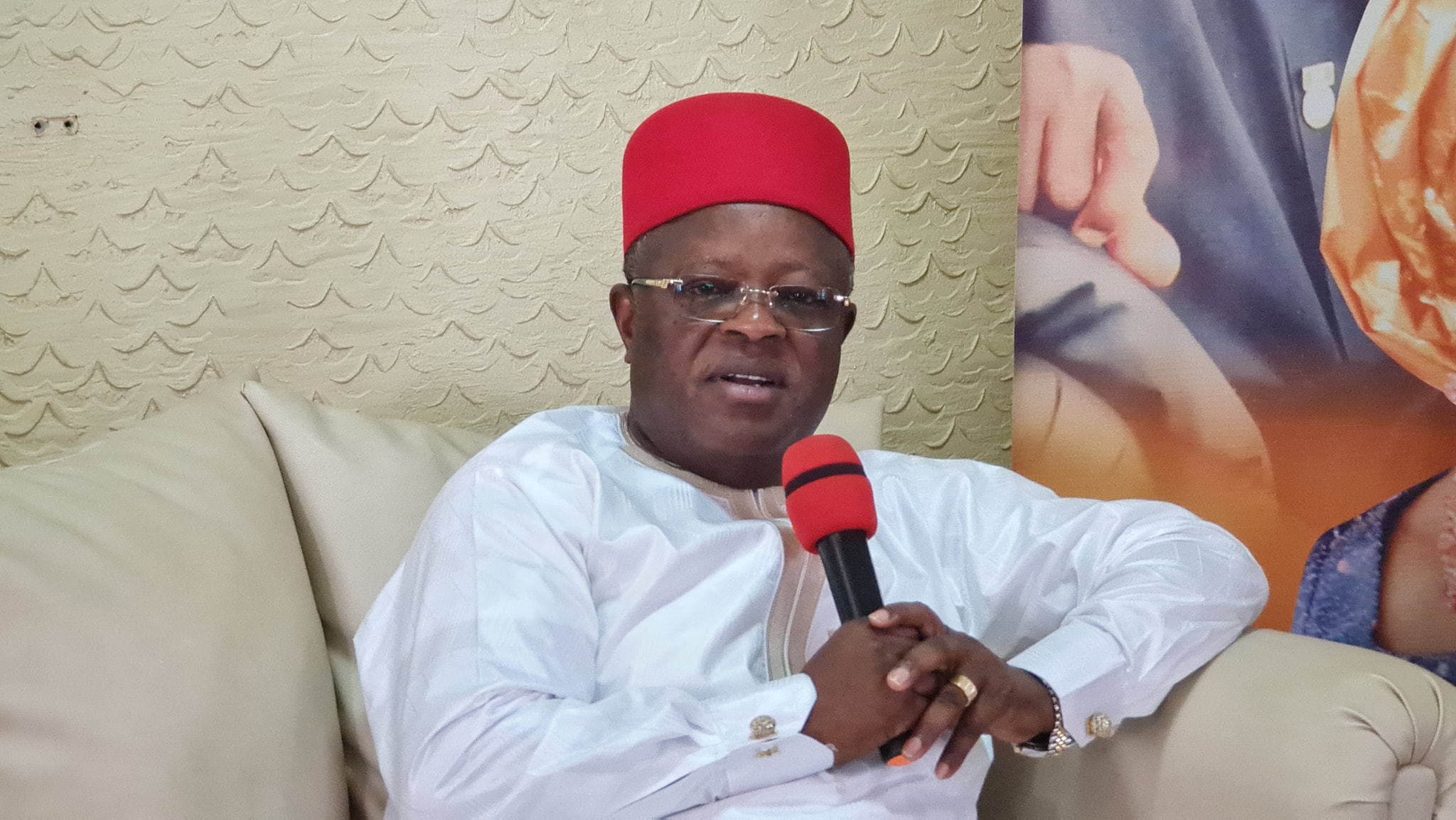News
IMF, World Bank remedies can’t revive Nigerian economy – Don

IMF, World Bank remedies can’t revive Nigerian economy – Don
The chairman, Board of Trustees (BOT) of the Centre for Transparency Advocacy, Dr. Chima Amadi, yesterday said economic remedies from the International Monetary Fund (IMF) and the World Bank cannot revive the Nigerian economy.
He also said the policies of the two international financial institutions may not be able to raise 200 million Nigerians out of poverty.
He asked the nation to look beyond ideas being imposed by developed countries.
He said developing countries should have the autonomy to choose policies that best suit their conditions.
Amadi, who made the submissions at the 4th National Colloquium in Sokoto, said the nation’s high inflation rate was indefensible.
He said: “Compared with other African and Asian countries, especially Indonesia, which is comparable to Nigeria in most respects, economic development in Nigeria has been disappointing.
News
May Day: A’Ibom gov increases minimum wage to N40,000

May Day: A’Ibom gov increases minimum wage to N40,000
Governor Bassey Otu of Cross River State has said henceforth, the least paid worker in the state will go home with N40,000 monthly, instead of N30,000.
He made this announcement in his address to workers when they celebrated this year’s Workers’ Day at UJ Esuene Stadium, Calabar.
He said he increased the wage based on economic reality as well as the lean federal allocations accrued to the state, and not out of sentiments.
Otu said his government was very appreciative of workers even though their industrial output was only 5 per cent which was very poor.
He said, “Government considers its workforce as the driver of lofty projects and programmes for the common good of the people. Workers in the State are always held in high esteem to achieve good results, which reason prompt payment of salary and pension has been up to date.”
“The State Government is presently on the verge of concluding necessary arrangements for the staggered payment of outstanding gratuity to its retired workers. I therefore sue for a little patience from the pensioners in this regard.”
READ ALSO:
- El-Rufai ignored us for 8 years, Kaduna NLC praises Gov Sani
- Umahi replies Obi over Lagos-Calabar coastal project criticism
- Appeal court takes over NURTW case as NIC withdraws
However, the Organised Labour in the State have have accused the state government of neglect and deceit, calling for open recruitment of employable youths to fill up various vacant positions.
Chairman of TUC, Comrade Monday Ogolodom, said the administration deceived the senior citizens when it failed to deliver its promise to clear off backlog of gratuities since 2013.
Addressing workers, Ogolodom said, “Payment of gratuity in the state has become a mirage. I recall on the 4 of October, 2023, during the swearing-in of the Head of Service, Innocent Eteng, His Excellency, the Governor made a very welcoming, sweet and promising speech, saying “before the end of December, 2023 all backlog of Gratuity in the state shall be cleared”.
“Today is 1″ May 2024, 4 (four) months after, nothing has started”, adding that this has portrayed the governor in bad light and appealed to him to set up machinery towards actualizing the promise as some of our elder statesmen and women were dying due to lack of funds for medications.
He alleged that bribes for promotion were now rampant, adding that it was appalling and discouraging for industrious and qualified workers.
He described as unending the verification exercise that was supposed to weed out ghost workers in the state, saying this has denied workers overdue promotions.
He called on government to officially embark on recruitment exercise instead of secret recruitments.
May Day: A’Ibom gov increases minimum wage to N40,000
News
El-Rufai ignored us for 8 years, Kaduna NLC praises Gov Sani

El-Rufai ignored us for 8 years, Kaduna NLC praises Gov Sani
The Chairman of the Nigeria Labour Congress (NLC), Kaduna state, Comrade Ayuba Magaji Suleiman, has hailed Governor Uba Sani for personally attending the May Day rally in Kaduna.
Speaking at Murtala Square, Kaduna, on Wednesday, Suleiman said the last time a governor personally attended the rally was nine years ago.
“Your Excellency, we want to thank you for personally attending the May Day Celebration. Labour has not witnessed the presence of a governor at such an occasion in the last nine years,” he said.
Malam Nasir El-Rufai, Sani’s predecessor, spent two terms of eight years as governor.
While commending the governor for prioritizing workers’ welfare through prompt payment of salaries and allowances, as well as involvement of the labour unions in decision making in the state, the NLC Chairman expressed hope that workers would enjoy favorable working conditions.
In his speech, the governor assured the workers of his support, saying development is about the people, just as governance is also about the people.
READ ALSO:
- Umahi replies Obi over Lagos-Calabar coastal project criticism
- Appeal court takes over NURTW case as NIC withdraws
- Inspector arrested with snatched car
He said governors were working with NLC to come up with decent and acceptable pay for workers.
The Government under my leadership will continue to prioritize workers’ welfare and equip them appropriately within available resources, conscious of the fact that a committed and motivated workforce is critical to the achievement of our Rural Transformation Agenda. Human capital development and poverty reduction will continue to receive robust government attention through investment in education, health, agriculture, housing, micro, small and medium enterprises, as well as support to security agencies as they tackle terrorism, banditry, kidnapping, and other violent crimes.
“Nigerian Governors, under the platform of Nigeria Governors Forum, are in consultation with Labour Unions at the federal and state levels in order to come up with a decent and acceptable salary increase for state and local government workers. As a comrade and veteran of the struggle for better working conditions for Nigerian workers, I will not rest on my oars until we agree on a wage package that will put smiles on the faces of our workers.
“As we ramp up our Rural Transformation Drive and implement innovative programmes to reinvent our economy, we seek the cooperation and total commitment of Kaduna State workers. Increased productivity and sustained industrial harmony will help reposition our economy and put our government in good stead to frontally tackle our myriad security and developmental challenges.”
El-Rufai ignored us for 8 years, Kaduna NLC praises Gov Sani
News
Umahi replies Obi over Lagos-Calabar coastal project criticism

Umahi replies Obi over Lagos-Calabar coastal project criticism
The Minister of Works, David Umahi has said that Peter Obi, the former governor of Anambra, is inciting the southeast to rebel against the federal government over the Lagos-Calabar coastal road project.
Umahi disclosed this on Wednesday at a road project stakeholders’ meeting in Lagos.
The Lagos-Calabar coastal road, which will pass through eight other states including the beach resorts along Lagos’ beachfront, has had its construction processs commenced by the federal government.
The project has generated controversy and concerns about funding and the businesses that would be affected during construction.
On Tuesday, Obi, presidential candidate of the Labour Party (LP) in the 2023 elections, criticised the federal government over the project, describing it as a misplaced priority.
READ ALSO:
- Appeal court takes over NURTW case as NIC withdraws
- Inspector arrested with snatched car
- Policeman chops off wife’s hand over N20,000 dispute
The former Anambra governor said the “insensitive” demolition of structures for the project was “heart-wrenching”.
Responding to Obi’s comment, Umahi said Obi supported the demolition of structures for road infrastructure while he was the governor of Anambra.
The minister condemned Obi for criticising the federal government over the project, adding that affected property owners are already being compensated.
“When you condemn people you bring judgment upon yourself and that is what he has done,” Umahi said.
“I think he is inciting some of the south-east people that are not well informed.
“He is inciting and getting them into trouble and he does not go to fight for them.
“Wisdom is a defence. It gives light to those that practice it. I want our people to have wisdom because I’m involved.”
Umahi added that the federal government did not destroy the facilities of Landmark Beach, noting that only shanties on the right of way were removed.
He said the owners of Landmark Beach were not unfairly treated in the construction of the project.
The minister accused Paul Onwuanibe, chief executive officer (CEO) of Landmark Africa Group, of politicising the issues arising from the project.
Umahi replies Obi over Lagos-Calabar coastal project criticism
-

 metro23 hours ago
metro23 hours agoLabour Day: Nigerian workers are dedicated, resilient, says NURTW leader
-

 Education2 days ago
Education2 days agoBREAKING: JAMB releases 2024 UTME results
-

 News2 days ago
News2 days agoSeun Kuti retracts allegation on P&ID fraud, tenders apology
-

 News2 days ago
News2 days agoTerrorist negotiator Tukur Mamu seeks transfer out of DSS custody to Kuje prison
-

 metro2 days ago
metro2 days agoBREAKING: Suspected herders kill 3 mourners, farmers in Enugu
-

 News2 days ago
News2 days agoGanduje probe: Kano commission invites public for information
-

 Auto4 hours ago
Auto4 hours agoAppeal court takes over NURTW case as NIC withdraws
-

 Sports2 days ago
Sports2 days agoApologise or face legal action, Enoh warns Bash Alli




















